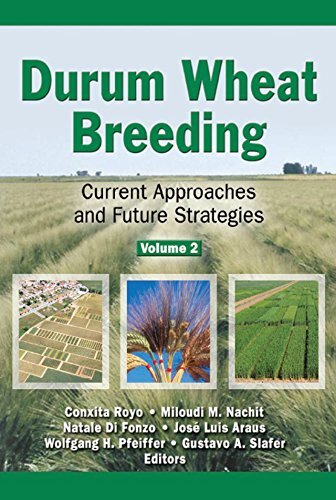
Durum Wheat Breeding: Current Approaches and Future Strategies, Volumes 1 and 2 (Crop Science) (English Edition)
- 作者
- Conxita Royo、Natale Di Fonzo
- 语言
- 英语
- 电子书格式
- epub,pdf,mobi,azw3,txt,fb2,djvu
- 下载次数
- 3486
- 更新日期
- 2023-08-21
- 运行环境
- PC/Windows/Linux/Mac/IOS/iPhone/iPad/iBooks/Kindle/Android/安卓/平板
内容简介
Is your knowledge about this important grain crop up to date?This comprehensive two-volume resource reviews the latest advances in scientific and technical knowledge for durum wheat breeding. With a scope of coverage that includes genetics and molecular biology, plant and crop physiology, and breeding strategies and methodology, Durum Wheat Breeding: Current Approaches and Future Strategies is designed to aid students, educators, and practitioners alike. More than 200 figures and tables make important information and concepts easy to access and understand.Though not primarily designed as a textbook, Durum Wheat Breeding is valuable supplementary reading for postgraduate courses on plant breeding, genetics and molecular biology as applied to agricultural crops, crop physiology, and other related subjects. Part One: World Distribution and the Role of Durum Wheat Breeding covers:
the evolution and taxonomy of wheat
uses of durum wheatpresent and future
breeding for improved yield
Part Two: Genetics and Molecular Aspects examines:
genetic diversity in durum wheat elite germplasm
collecting and managing genetic resources
wheat cytogenetics
the impact of genetic manipulation upon grain composition and quality
resistance to abiotic stresses, diseases, and pests
the genetic bases of grain quality
Part Three: Physiological Bases of Durum Wheat Improvement addresses:
advances in yield through genetic improvement
ideotypes for sustainable farming
the physiological basis of yield potential in durum wheat
adaptive mechanisms for water stress
functional determinants of grain quality
Part Four: Breeding Strategy and Methodology focuses on:
increasing yield potential and stability
selection tools that can strengthen physiological traits that improve yield
selection strategies for winter- and facultative durum wheat and for biotic stress resistance
breeding methods and strategies designed to improve the quality of durum wheat
the value of wide crosses
the doubled-haploid technique
the management of genotype x environment interactions
proper design and analysis of field experiments
Part Five: Applied and Strategic Research in Different Durum Breeding Programs examines some of the most important breeding/improvement programs worldwide, with case examples from Italy, Spain, Romania, Canada, Morocco, the United States, Turkey, and India, as well as the CIMMYT’s international durum wheat breeding program.From the authors:Durum wheat breeding has been quite successful during the last half-century or so in most regions in which it is a traditional crop. This success, like that of other major crops, has been brought about by the traditional breeding approach of trial and error together with the ’eye’ of the breeder in the selection process. There is a growing consensus, however, that future breeding may be far more efficient if it takes into account not only the newest developments in knowledge for breeding strategies and methodologies, but also advances in scientific areas that may assist breeding to reach its objectivesmainly genetics/molecular biology and plant/crop physiology. It is our hope that this volume will be a valuable resource to current and future generations of wheat growers, breeders, and scientists.
Durum Wheat Breeding: Current Approaches and Future Strategies, Volumes 1 and 2 (Crop Science) (English Edition) EPUB, PDF, MOBI, AZW3, TXT, FB2, DjVu, Kindle电子书免费下载。
- 《文心雕龙》杨国斌英译本 (English Edition) 杨国斌
- 好睡:新的睡眠科学与医学 杨定一
- 伤寒质难:火神师门问答录 祝味菊、陈苏生
- 共享发展:更好造福各国人民(英文版)Sharing the Development: Create More Benefits for People of All Countries (English Version) (English Edition) 中国人权研究会China Society for Human Rights Studies
- 养肝就是养气血 卢秉久、郑佳连
- 医林改错 高树中,杨骏
- 实用重症医学(第2版) 刘大为
- 1918:第一次世界大战的最后一年(普利策奖得主约翰·托兰书写一战历史的经典作品;国内老译本绝版30年,英文版畅销欧美40年累计销量超100万册) 约翰·托兰、何中夏
- 巧做“洋八股”:心理学英文论文写作与发表 (社会转型与社会治理论丛) 陈斌斌
- 人体解剖学 邵水金
- 《毛泽东年谱(全九卷)》 中央文献研究室
- 现代麻醉学(第4版)(套装共2册)(畅销30年经久不衰的传世精品专著集全国麻醉学专家编写,国家重点图书出版规划项目,被评为全国优秀科技图书一等奖,堪称麻醉学领域的“圣经”) 邓小明、姚尚龙、于布为、黄宇光
- 中医骨伤科学 黄桂成、王拥军
- GB50217-2007电力工程电缆设计规范(英文版) (English Edition) 中华人民共和国建设部
- DL/T5437-2009火力发电建设工程启动试运及验收规程(英文版) (English Edition) 电力企业联合会
- 和平与发展:世界反法西斯战争的胜利与人权进步(英文版)Peace and Development: Victory of World Anti-Fascist War and Human Rights Advancement(English Edition) 中国人权研究会Peace and Development: Victory of World Anti-Fascist War and Human Rights Advancement
- 俄藏西夏历日文献整理研究 (国家哲学社会科学成果文库) 彭向前
- 持续葡萄糖监测 贾伟平
- The International Handbook of Computer Security (English Edition) Jae Shim、Anique A. Qureshi、Joel G. Siegel
- 妇产科医生说备孕 王凌
- 中国康养产业发展报告(2020) (康养蓝皮书) 何莽、杜洁、沈山、彭菲、崔永伟
- 标准取穴定位图册:高清真人图解版 尹爱兵、任超
- Contemporary China’s Diplomacy(English Edition)新版当代中国系列-当代中国外交(英文版) Zhang Qingmin张清敏
- 中国走社会主义道路为什么成功(英文版)Why Has China Achieved Success By Taking The Socialist Road(English Edition) 戴木才Dai Mucai、贺龙平
- 现代口腔正畸技术与临床思维 (现代实用口腔医学著译丛书) 张栋梁
- TCM Case Studies: Eye, Ear, Nose and Throat Disorders 中医病案教育系列:眼耳鼻咽喉科学(英文版) 彭清华、Cara O. Frank,Portia Barnblatt
- 马一浮经典作品全集(简体横排)(套装共三十册)【与梁漱溟、熊十力合称为 “新儒家三圣”!现代中国第一位系统开展儒家教育的人!是引进马克思《资本论》德文版、英文版的中华第一人!简体横排,数字版首次面世!】 马一浮
- 温病条辨 (中医经典必读丛书) (清)吴瑭
- 国家卫生和计划生育委员会住院医师规范化培训规划教材 神经病学 贾建平、陈生弟
- Automatic Chemical Analysis (English Edition) WARREN T. CORNS